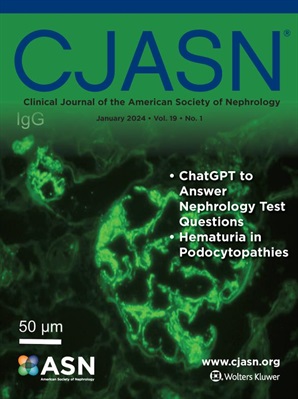Proteomic Analysis Uncovers Multiprotein Signatures Associated with Early Diabetic Kidney Disease in Youth with Type 2 Diabetes Mellitus.
IF 8.5
1区 医学
Q1 UROLOGY & NEPHROLOGY
Clinical Journal of the American Society of Nephrology
Pub Date : 2024-12-01
Epub Date: 2024-10-21
DOI:10.2215/CJN.0000000000000559
引用次数: 0
蛋白质组分析发现与 2 型糖尿病青少年早期糖尿病肾病相关的多种蛋白质特征
背景:青少年2型糖尿病患者的糖尿病肾病(DKD)发病时间往往较早,导致成年后出现并发症。2型糖尿病青少年患者急需与DKD早期发病相关的风险生物标志物:我们对青少年 2 型糖尿病治疗方案(TODAY)研究中 374 份基线血浆样本中的 6596 种蛋白质(SomaScan 7K)进行了深入分析,以确定与白蛋白尿(尿白蛋白与肌酐比值 [UACR] ≥30 mg/g)、估计肾小球滤过率(eGFR)快速下降(eGFR 年下降率 >3 mL/min/1.73m2 和/或连续两次≥3.3%],以及高滤过(连续两次≥135 mL/min/1.73m2 )。对排名前 100 位的蛋白质(按 p 值排序)进行了弹性网 Cox 回归和 10 倍交叉验证,以确定 DKD 结果发生时间的多蛋白特征:TODAY研究的参与者(14±2岁,63%为女性,糖尿病病程7±6个月)出现早期DKD的比例很高:43%出现白蛋白尿,48%出现高滤过,16%出现eGFR快速下降。7种和3种蛋白质水平的升高分别预示着白蛋白尿和eGFR快速下降发生时间的缩短;118种蛋白质预示着高滤过发生时间的缩短。弹性网状 Cox 比例危险模型确定了早期 DKD 发病时间的多蛋白特征,与临床协变量和选定蛋白质模型的一致性在 0.81 和 0.96 之间,而仅与临床协变量模型的一致性在 0.56 和 0.63 之间:我们的研究揭示了在青年期发病的2型糖尿病早期与DKD相关的蛋白质组变化。蛋白质组分析确定了预测青年 2 型糖尿病患者 DKD 风险的有希望的风险因素,并可加深我们对 DKD 机制和潜在干预措施的了解。
本文章由计算机程序翻译,如有差异,请以英文原文为准。
求助全文
约1分钟内获得全文
求助全文
来源期刊
CiteScore
12.20
自引率
3.10%
发文量
514
审稿时长
3-6 weeks
期刊介绍:
The Clinical Journal of the American Society of Nephrology strives to establish itself as the foremost authority in communicating and influencing advances in clinical nephrology by (1) swiftly and effectively disseminating pivotal developments in clinical and translational research in nephrology, encompassing innovations in research methods and care delivery; (2) providing context for these advances in relation to future research directions and patient care; and (3) becoming a key voice on issues with potential implications for the clinical practice of nephrology, particularly within the United States. Original manuscript topics cover a range of areas, including Acid/Base and Electrolyte Disorders, Acute Kidney Injury and ICU Nephrology, Chronic Kidney Disease, Clinical Nephrology, Cystic Kidney Disease, Diabetes and the Kidney, Genetics, Geriatric and Palliative Nephrology, Glomerular and Tubulointerstitial Diseases, Hypertension, Maintenance Dialysis, Mineral Metabolism, Nephrolithiasis, and Transplantation.

 求助内容:
求助内容: 应助结果提醒方式:
应助结果提醒方式:


